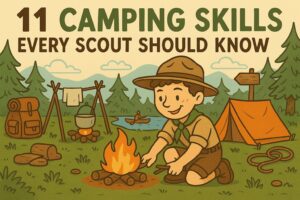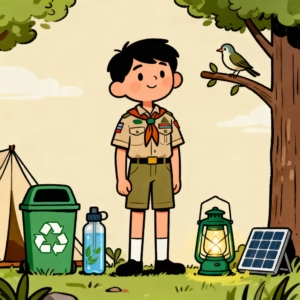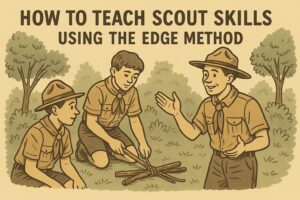Camping is at the heart of the Scouting experience. From weekend campouts to high-adventure treks, Scouts learn to be prepared, responsible, and self-reliant in the outdoors. But to succeed on these adventures, you need more than just gear—you need skills.
In this guide, we’ll cover 11 essential camping skills every Scout should know. Whether you’re a brand-new Scout or preparing for your next rank, mastering these fundamentals will make your time in the wild safer and more enjoyable.
1. How to Set Up a Tent
Knowing how to properly pitch a tent is a core skill for any Scout. You should be able to:
- Choose a good campsite (flat, dry, away from hazards)
- Stake and tension the tent correctly
- Keep the inside dry and organized
Practice at home or during troop meetings before heading into the field.
2. How to Build and Maintain a Campfire
Fire building is a classic skill taught throughout Scouting. Learn how to:
- Use fire lays such as the teepee, log cabin, and lean-to
- Start a fire safely using matches, flint and steel, or fire starters
- Keep the fire controlled and extinguish it completely
Scouts must also follow safety rules required for the Firem’n Chit.
3. How to Cook a Meal Outdoors
Cooking is part of both camping fun and personal responsibility. You should know how to:
- Plan a simple meal
- Cook over a fire or camp stove
- Clean up properly to avoid attracting animals
Start with easy meals like foil packets or one-pot stews. This will help you a ton with the cooking merit badge!
4. How to Use a Pocketknife Safely
Covered in the Totin’ Chip, pocketknife use is a skill that should be reinforced on every outing. Scouts should know:
- When and where to use a knife
- Safe cutting techniques
- How to sharpen, clean, and store the blade
Knife safety is also closely tied to personal responsibility in camp. Check out our guide on earning your Totin Chit here and our guide on sharpening a pocketknife here.
5. How to Tie Basic Knots
Knots are essential for shelter setup, gear repairs, and more. Every Scout should know:
- Square knot
- Two half-hitches
- Taut-line hitch
- Bowline
These knots are required for rank advancement and are frequently used at camp. Check out our guide on how to tie every scouting required knot here.
6. How to Purify Water
Drinking untreated water can cause serious illness. Scouts should know how to:
- Boil water
- Use chemical tablets or filters
- Store clean water properly
Water purification is an important safety skill, especially on backpacking trips.
7. How to Pack a Backpack
Packing your gear the right way makes a huge difference in your comfort and safety. Learn how to:
- Balance weight correctly (heavier items near your back)
- Prioritize essentials like a first aid kit, flashlight, and rain gear
- Keep your pack organized and weather-resistant
Packing efficiently is key for both short campouts and long treks.
8. How to Stay Warm and Dry
Cold and wet conditions are common causes of discomfort and danger. Scouts should understand:
- How to layer clothing (base, insulation, and outer shell)
- Why cotton should be avoided in cold weather
- How to manage wet gear and dry out items safely
Proper clothing choices can prevent hypothermia and make camping more comfortable.
9. How to Keep a Clean Campsite
A clean site is safer, more enjoyable, and more environmentally responsible. Scouts should:
- Store food securely and keep trash contained
- Wash dishes 200 feet away from water sources
- Follow Leave No Trace principles
A clean camp also discourages wildlife from entering your area.
10. How to Respond to Emergencies
Scouts need to be ready to act when things go wrong. This includes:
- Treating common injuries (cuts, burns, insect bites)
- Staying calm in stressful situations
- Knowing when and how to seek help
First aid and emergency skills are taught through rank requirements and merit badges.
11. How to Plan for a Campout
Planning is just as important as what happens at camp. Every Scout should be involved in:
- Creating a packing list
- Understanding the destination and weather
- Assigning patrol duties like cooking, cleaning, and setup
This skill builds leadership and helps Scouts take responsibility for their experience.
Final Thoughts
Scouts who master these 11 camping skills are better prepared for the challenges and rewards of outdoor adventure. From setting up camp to handling emergencies, these fundamentals build confidence, independence, and a deeper appreciation for nature.
If you’re a new Scout, focus on one skill at a time and look for ways to practice them during troop events, summer camp, or weekend hikes. If you’re a parent or leader, encourage Scouts to take the lead and learn by doing.




